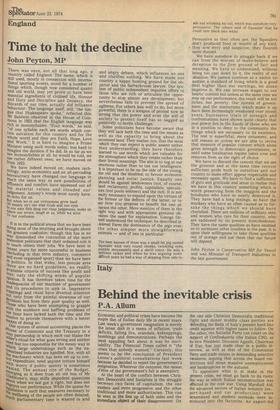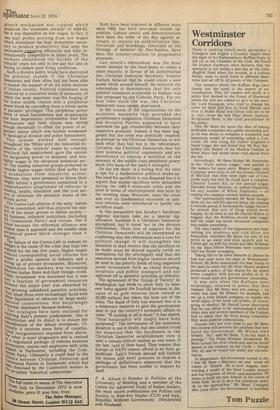Italy
Behind the inevitable crisis
P.A. Allum
Economic and political crises have become the staple diet of Italian daily life in recent years. Last week's government resignation is merely the latest dish in a menu of inflation, trade deficits, falling lira, scandals, kidnappings, bombings and demonstrations. Perhaps the most appalling fact about it was its inevitability. The Financial Times called it "the crisis that nobody wanted." Certainly, this seems to be the conclusion of President Leone's political consultations last week because he decided to reject the government's resignation. Whatever the outcome, the raison d'être of the government's fall is exemplary.
At the heart of the conflict between Christian Democrats and Socialists is the struggle between two faces of capitalism, the one modern and more progressive and the other traditional and more authoritarian. This can be seen in the line up of both sides and the Immediate object of their disagreement. On
the one side Christian Democrats, traditional right and minor middle class parties are defending the Bank of Italy's present hard-line a-edit squeeze with higher taxes to follow. On the other: the Socialist Party can count on the support of Confindustr-ia (the Italian CBI), as its new President, Giovanni Agnelli, Chairman of Fiat, has just made clear in a public interview, as well as that of the Communist Party and trade unions in demanding selective measures, arguing that across the board restrictions will mean massive unemployment and bankruptcies in the autumn.
To appreciate what is at stake in the present crisis, we must go back to its roots: the way in which Italian reconstruction was dfected in the cold war. Using Marshall Aid, the advanced sectors of Italian industry (export-based and car production) were streamlined and modern methods were introduced into the factories. An export-led growth mechanism was created which Produced the 'economic miracle' of 1958-62,
but it was dependent on low wages. In fact, it Was high profits accruing from low wages Which stimulated the high investment necessary to produce productivity that kept the inechanism_marAting efficiently and Italy internationally competitive in those years. The Workers shouldered the burden of the Miracle' years not only in low pay but also in having to endure poor living conditions.
Such a divisive policy would have destroyed the political system if the Christian L'emocrats and their allies had not been able to muster the support of all the other sections of Italian society. Political consensus was achieved by a concerted series of measures, of Which the most important was the forging of the lower middle classes into a peripheral Pnvver block by conceding them a whole series 91 parasitic privileges. This peripheral power block of small businessmen and shopkeepers and their dependants, professional men ana hOreaucrats and their clients was strong enough electbrally to offset the power of organised labour which was further weakened °Y ideological division and police harassment. This system worked well enough throughout the 'fifties until the industrial expansion of the 'miracle' years by creating structural full employment gave the unions the bargaining power to demand, and win, ,htgher wages in the advanced industrial seem'. The leading industrial groups preferred to concede higher wages rather than suffer loss production from industrial action. Noreover, they were prepared to throw their eight behind a government committed to a ch°raprehensive programme of reforms in „Nsing, health, education and the civil serLice to eliminate the parasitic waste of the 'ervice sector. The centre-Left alliance of the early 'sixties \v4s so committed, and thus enjoyed the supof the major groups in Italian society t,tg business, reformist politicians (including fue Communist Party) and unions. Yet it ailed because the reformist alliance was beaker than it appeared and the middle class ,eriPheral power block stronger than it "--F„nled.
the failure of the Centre-Left to redeem its Pled -ges is the cause of the crisis that Italy has
u/41.d,,ored for the last five years. Higher wages inout corresponding social reforms has leant a profits squeeze in industry and a cro-Ying up of private investment. Moreover, PLIPetition for markets was increasing R'Iween Italian firms and their foreign rivals.
investment was increased but it was bnlY a fraction of government resources eecaUse the, major part was absorbed by iller-growing subsidised parasitic activities. eitillts, small firms were increasingly faced with 4„,er liquidation or takeover by large multi c'tlonal corporations. Not surprisingly (3-1,r1ornic depression became endemic. ‘,v0 strategies have been outlined for auXVing Italy's present predicament. One is ki-Lloritarian and its object is to ensure the unluordination of the labour movement. UltioatelY it involves some form of constitu'Nnal reorganisation imposed from above. e other is more progressive and is centred go: negotiated package of reforms between %.1,sernment, unions and employers with wide rtilloPort in Parliament, including the Comallinist Party. Ultimately it could lead to the o'aoce between Christian Democrat and beenThoUnist Parites in Parliament which has then theorised by the Communist leaders in so-called "historical compromise.'
Both have been explored in different ways since 1969, but have provoked violent op position. Labour unrest and demonstrations
have been the order of the day against attempts to impose an authoritarian line.
Terrorism and bombings, theorised as the 'strategy of tensions' by Neo-fascists, have been the counter-reaction to progressive proposals.
Last month's referendum was the most recent attempt by the hard-liners to create a silent majority in favour of an authoritarian line. Christian Democrat Secretary, Senator Fanfani, believed th,at he could create a new power block around himself. He intended the referendum to demonstrate that the only political consensus acceptable to Italians was that proposed by the Catholic Party. For the first time since the war, the Christian Democrats were openly disavowed.
In the course of the negotiations on the economic measures that preceded the government's resignation Christian Democrat and Socialist Parties appeared to have narrowed the gap considerably between their respective positions. Indeed, it has been sug gested that the crisis was politically inspired: an attempt by the Christian Democrats to win back what they had lost in the referendum.
Certainly the Christian Democrats fear for their postwar political supremacy and are determined to impose a solution in the interests of the middle class peripheral power block (the basis of the party's strength).
On the left there is a feeling that the time is ripe for a fundamental political shake-up.
The need for sacrifices is not disputed but it is argued that similar sacrifices were demanded during the 1963-5 economic crisis and the
price in terms of unemployment was born by the working class. Moreover, once the crisis was over no fundamental economic or political. reforms were introduced to justify the sacrifices made.
In this perspective last Sunday's Sardinian regional elections take on a special sig nificance. Sardinia is a Christian Democrat stronghold, but it voted 'no' in the divorce referendum. Thus, loss of support for the Christian Democrats will be interpreted as confirming that the referendum was a vote for political change. It will strengthen the Socialists in their resolve that the sacrifices to be made must be shared equally (with no exemptions for the privileged); and that the resources derived from higher taxation should be used in the priority fields of long neglected social investment such as cheap housing, hospitals and public transport and not siphoned off in parasitic activities as hitherto.
The agreement of the 'Group of Twenty' in Washington last week to allow Italy to raise new loans against the fourfold increase in the value of its gold reserves (now valued at £5,380 million) has taken the heat out of the crisis. The Bank of Italy has warned that it is a temporary measure to give the government time to put the country's economic affairs in order. "If nothing at all is done," it has stated, "final bankruptcy will simply have been postponed." The seriousness of the economic situation is not in doubt, but one cannot avoid the suspicion that the hardliners in the i Christian Democrat establishment view t with a certain cynical realism as one more, if the last, card in their hand. They reason that Europe or NATO cannot afford to let Italy go bankrupt: Italy's friends abroad will furnish the means and exert pressure to impose a package of deflationary measures that the government has been unable to impose by itself.
P. A. Allurn is Reader in Politics at the University of Reading and a member of the Centre for Advanced Study of Italian Society. His most recent publications are Politics und Society in Post-war Naples (CUP) and Italy, Republic Without Government (Weidenfeld and Nicolson).



































 Previous page
Previous page